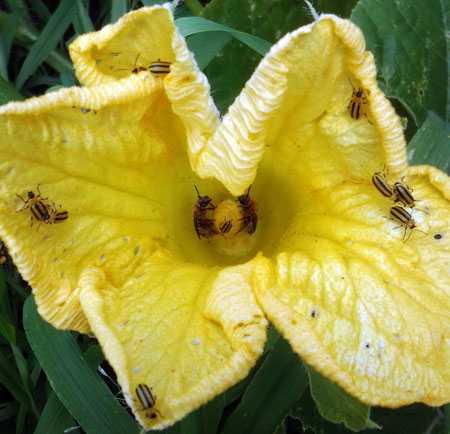Saginaw Bay area vegetable regional report – July 16, 2014
Disease pressure is increasing in Michigan’s Bay and Thumb area vegetable crops.

More rain came through the area last week and over the weekend, but the surge in disease pressure probably stemmed from the rains we received two weeks ago. The recent and future moisture has the opportunity to spread diseases, so please contact me at phill406@msu.edu or 989-758-2500 ext. 202 to grab a sample, or send any suspected diseases to Michigan State University Diagnostic Services.
The rainfall and growing degree day (GDD) base 50 degrees Fahrenheit accumulations as of July 14, 2014 from MSU Enviro-weather stations at the following Bay and Thumb area vegetable growing regions are as follows:
- Romeo: 12.62 inches, 1215.7 GDD (+0.1 inches, and +100.9 GDD from last week).
- Lapeer: 15.2 inches, 1184.4 GDD (+0.45 inches, and +93.3 GDD from last week).
- Frankenmuth: 15.08 inches, 1189.5 GDD (+0.67 inches, and +91.9 GDD from last week).
- Munger: 13.92 inches, 1202.2 GDD (+0.08 inches, and +91.6 GDD from last week).
- Linwood: 13.68 inches, 1095.7 GDD (+0.7 inches, and +88.8 GDD from last week).
In my Michigan State University Extension visits to the major Macomb, Lapeer and Bay county vegetable areas, my best estimates of crop progress are below.
Sweet corn is being harvested in some areas. Corn earworms and European corn borers are being kept in check with Warrior, Baythroid and Mustang Max. Growers of mixed vegetables should avoid using Sevin dust as it is highly toxic to honey bees and easy for them to pick up and bring back to the hive.
Onions are exhibiting disease symptoms in some areas after the series of rain events over the last week. Send whole plants to MSU Diagnostic Services if you see “water-soaking” on the leaves or browning tips along with white spots.
Late blight disease in potatoes has been confirmed in Montcalm County.
Red beets are being harvested. Snap and shell peas are being harvested. String, bush and wax beans are flowering and setting fruit.
Melons are setting fruit. This wet weather will set back watermelons a bit. Honey bees will visit these into the evening, so avoid neonicotinoid sprays.
Summer squash and zucchini are being harvested daily, and winter squash and pumpkins are vining with male flowers in the bud stage. Root rots have been showing up in Saginaw County, and I have collected samples to send to campus. Keep an eye out for squash bees, the best pollinator of these crops. Their entire life is built around pollinating these particular vine crops – not melons, and not cucumbers. You can find males resting inside the closing flowers in the afternoon.

The male squash bees sit patiently inside collapsing flowers until the next morning. Then, they chew their way out and look for females in fresh pumpkin and squash flowers.
Slicing cucumbers are being harvested in fields. Pickling cucumbers are continuing to be planted while early-planted pickles are being harvested. Downy mildew has been confirmed in Gratiot County. There is no charge for sending suspected downy mildew samples to the Hausbeck lab. Mary Hausbeck recommends starting to apply preventative downy mildew sprays.
Tomatoes, peppers and eggplants are in various stages of growth and harvest. Colorado potato beetles can be a big problem in eggplants.



 Print
Print Email
Email




